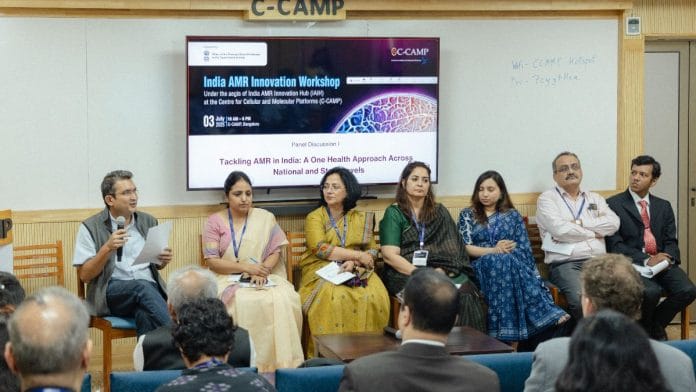Bengaluru: The Indian government wants innovators and entrepreneurs to join it in the fight against antimicrobial resistance (AMR). The Centre for Cellular and Molecular Platforms (C-CAMP) Thursday launched a ‘One Health AMR Challenge 2025’ in Bengaluru to support technologies tackling AMR.
Every year, around a million Indians are killed by bacterial-related infections that don’t respond to antibiotics. The initiative will support breakthrough technologies tackling AMR across human, animal, and environmental health, and offer financial support ranging from $50,000 to $250,000 (approximately ₹40 lakh to ₹2 crore) based on technology readiness. C-CAMP, an initiative of the Department of Biotechnology, Ministry of Science and Technology, launched the challenge with support from the International Centre for Antimicrobial Resistance Solutions (ICARS), which provides One Health intervention and implementation research support to low- and middle-income countries (LMICs) in their efforts to prevent and mitigate AMR.
“We look forward to working together to foster solutions for AMR by leveraging cutting-edge research and contributing to policy making at the Central and State levels to combat this huge global threat,” C-CAMP CEO Dr Taslimarif Saiyed said at the India Antimicrobial Resistance Innovation Workshop Thursday.
Scientists, researchers, doctors, pharmaceutical and government officials participated in sessions at the day-long event that focussed on tackling AMR at the national and state level.
“AMR is a pandemic in many ways. We see that a multi-sectoral coordination response for this AMR crisis would be looked at from all angles—be it animal, human, environmental interface,” Ajay Sood, Principal Scientific Adviser to Govt of India, said at the event.
Selected startups will get comprehensive technical assistance, including regulatory, legal, IP, manufacturing, and market readiness support, it was announced.
Also Read: Bengaluru startups are 3D-printing human body parts. It’s sci-fi to surgery
‘Importance of shift towards tech’
In low- and middle-income countries, like India, the issue of AMR is more complex than in others due to the massive use of antibiotics, according to a 2017 study published in Antimicrobial Resistance and Infection Control.
In a 2019 study published in the Indian Journal of Medical Research, the authors report an ineffective implementation of AMR combating policies, such as awareness and proper monitoring of the situation in the country.
At the press briefing, Dr Saiyed emphasised the importance of a shift towards science and technology to fight AMR.
The tests in the market currently take up to five days to figure out the level of antibiotic resistance of a patient. This delay forces doctors to rely on trying to see which antibiotics work for a patient in a hospital bed, whose health is worsening.
“If we can have the technology to do a quick detection to understand which antibiotics should be (quickly) given, there is better hope,” Dr Saiyed said.
According to Sood, a yet-to-be-explored area in the fight against AMR in India lies in how drugs can be designed faster using high-speed computers.
Quantum computing & AMR
Quantum computing can shorten the time required for molecular simulations in drug development. The technology bypasses the time-consuming trial-and-error methods to identify antibodies that can kill the resistant bugs.
“In drug discovery, we conduct docking studies to find the right molecules or antibodies that can target pathogens. Quantum computing solves these optimisation problems faster,” Principal Scientific Adviser Sood told The Print.
However, the use of high-speed computers comes with challenges. The unclear intellectual property protections, and need for better integration between computational models and results from laboratory experiments, have been identified as key concerns, according to a 2025 study in the Journal of Pharmaceutical Analysis.
At the event, there were also panel discussions that brought together global stakeholders, such as those from the World Bank, to explore overseas collaborations to strengthen locally relevant AMR solutions in the context of the Indian landscape.
“We look forward to working together to foster solutions for AMR by leveraging cutting-edge research and contributing to policy making at the central and state level to combat this huge global threat,” Dr Saiyed said.
(Edited by Mannat Chugh)
Also Read: Indian scientists are arming plants through gene editing. And climate-proofing them






